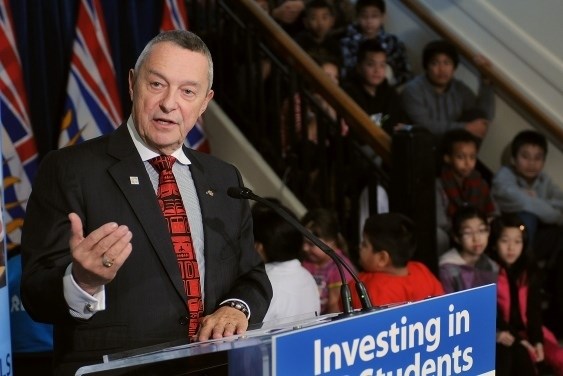The minister responsible for local government has shot down a request from a Vancouver city councillor to hold a referendum during next year’s provincial election to determine whether municipalities should be allowed to set their own campaign finance reform rules.
Peter Fassbender, who also oversees community, sport and cultural development, told the Courier in a statement Tuesday that “we do not anticipate any further changes to campaign finance rules or a referendum at this time.”
The provincial election is set for May 9, 2017.
Vision Vancouver. Coun. Andrea Reimer introduced a motion at Tuesday’s council meeting that requested Fassbender and the Liberal government put a question on the ballot to gauge the public’s support for getting big money out of civic politics.
Currently, there are no spending limits for municipal parties.
Reimer made the request the week after the government passed Bill 17, better known as the Local Elections Campaign Financing Amendment Act. The bill, which is awaiting Royal Assent in the legislature, will set expense limits for candidates running in B.C.’s 2018 municipal elections.
“This legislation will establish the framework for expense limits for candidates for mayor, council, regional district electoral directors, school board and certain special purpose bodies,” Fassbender said.
Reimer’s understanding of the bill is there will be very few limits on spending. She and her council colleagues have argued since the bill was introduced that it doesn’t go far enough.
In fact, Reimer said Tuesday, the rules are “actually — believe it or not, after 12 years or working on this — worse than they were when we started in so much as the election period has actually been shrunk and the amount of so-called dark money can actually increase in the process.”
Dark money is the term given to the money political parties collect in between elections. The amount of money and who donated it to a party is often not recorded in parties’ public financial disclosure statements.
“Out of frustration, I think we’re sort of at the end of what we can do and this is something that I think we can do — is ask the people to have a voice in this ongoing frustration for our council,” said Reimer, who has led council’s charge to ban union and corporate donations, put caps on contributions from individuals, bring in election spending limits, have ongoing reporting of donations and better measurements for enforcement.
In her motion, which council is scheduled to debate May 3, Reimer pointed out council has a longstanding history dating back to 2005 of sending formal requests to the provincial government to change campaign finance rules. Only the provincial government can give Vancouver the power to amend the rules.
The provincial government’s bill is rooted in recommendations from the Local Government Elections Task Force, which completed its report in 2010. Vancouver city council panned the report, saying it put no limits on contributions or a ban on union and corporate donations.
But Fassbender said of developing the bill that "the process and product make a great success story for democracy in British Columbia, and completes our implementation of the Local Government Elections Task Force's good work.”
In previous campaigns, Vision Vancouver and the NPA have relied heavily on donations from corporations, particularly developers. Vision has also received large donations from unions.
In 2014, Vision spent $3.4 million and the NPA spent $2.4 million. Vision received most of its money — $1.9 million — from corporations and more than $360,000 from unions. Individual donations totalled $554,000.
The NPA received the bulk of its donations from corporations, with party president Peter Armstrong, owner of Great Canadian Railtour Company Ltd, giving $740,000. Robert Macdonald, former vice-president of the NPA and owner of Macdonald Development Corp, donated $165,000.
@Howellings



